#A Companion to Ancient Epic
Explore tagged Tumblr posts
Text
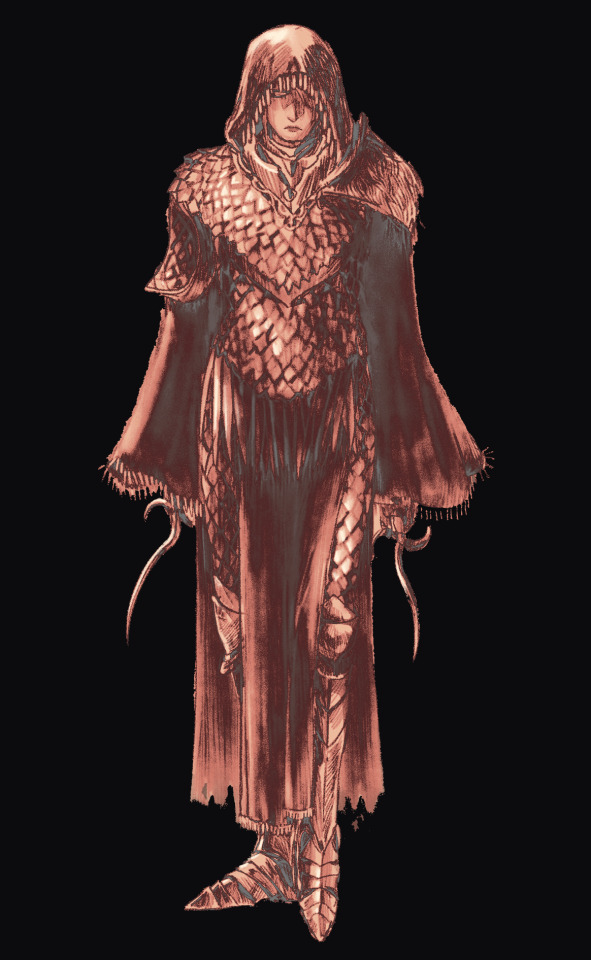
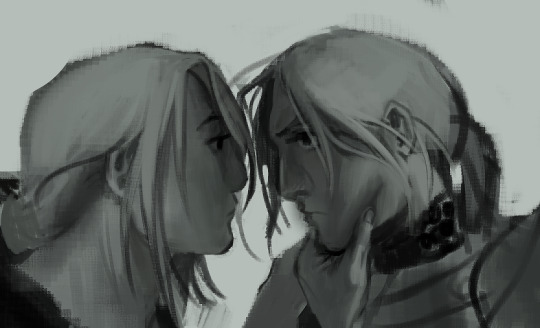
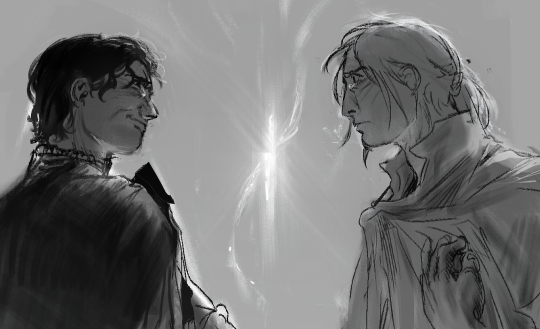
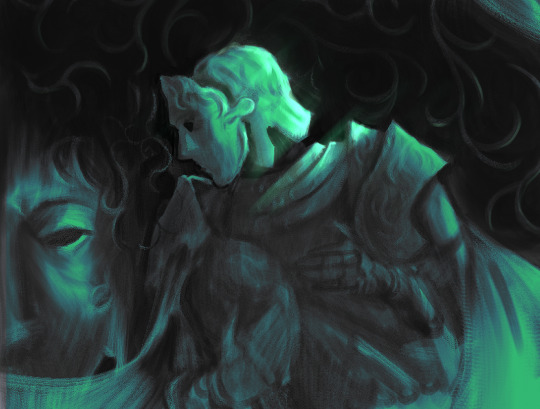
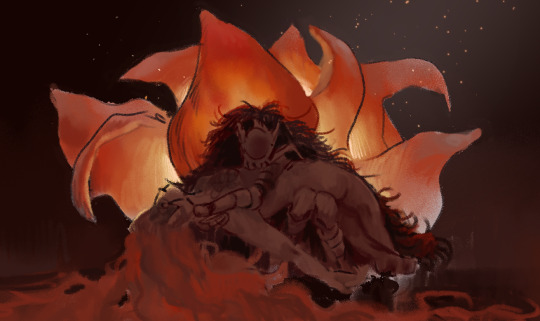
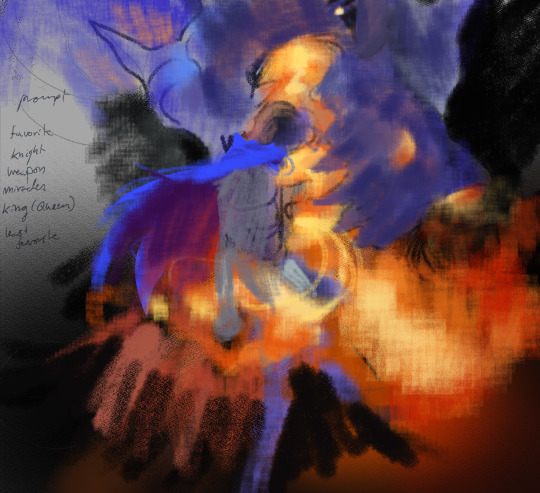
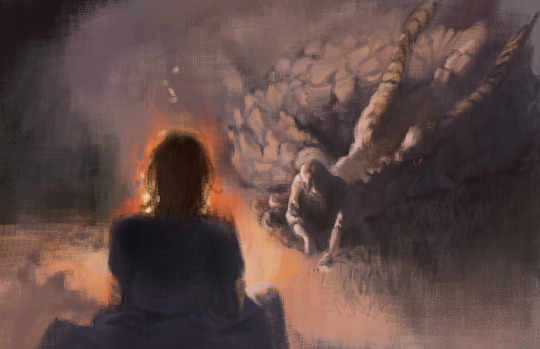
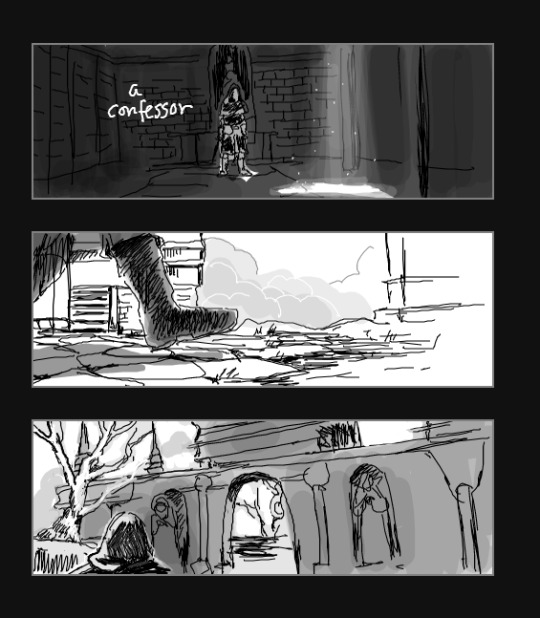
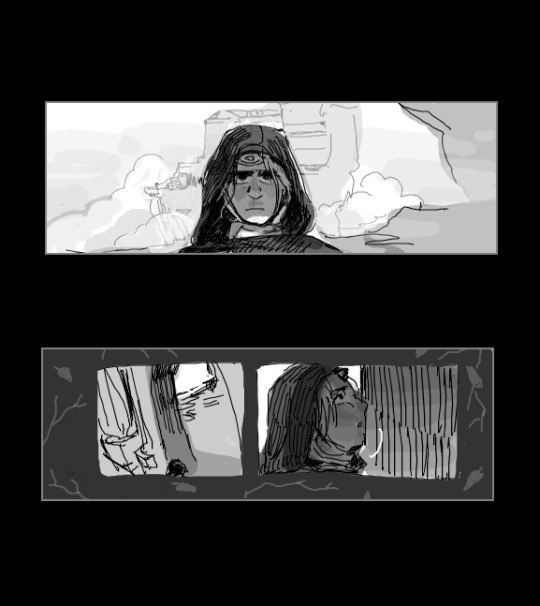
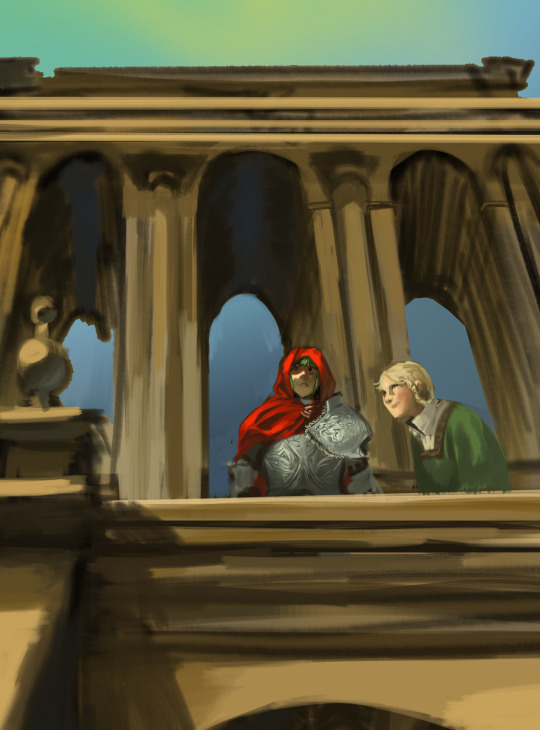
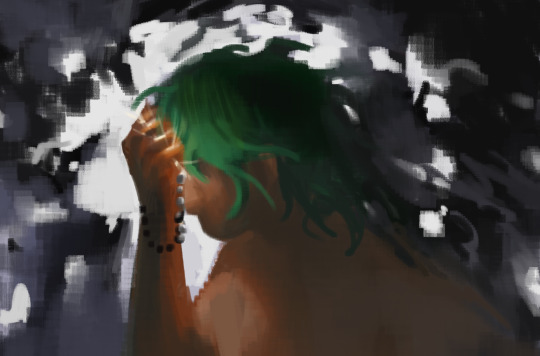
elden ring things.. i never shared...i had so much....i drew so much...wtf
#elden ring#fia the deathbed companion#sorcerer rogier#d hunter of the dead#d beholder of death#elden ring oc#festering fingerprint vyke#elden ring malenia#vyke elden ring#ancient dragon lansseax#these names are so fucking funny#i feel like im the opening cinematic narrator naming every epic hero rn#finlay elden ring#um its a lot to alt text i promise ill get to it when im not tired as fak#kir art
250 notes
·
View notes
Text
Concept art for a new painting, based on a picture of me and my uncle's dog (he's a sweetheart 🥺)
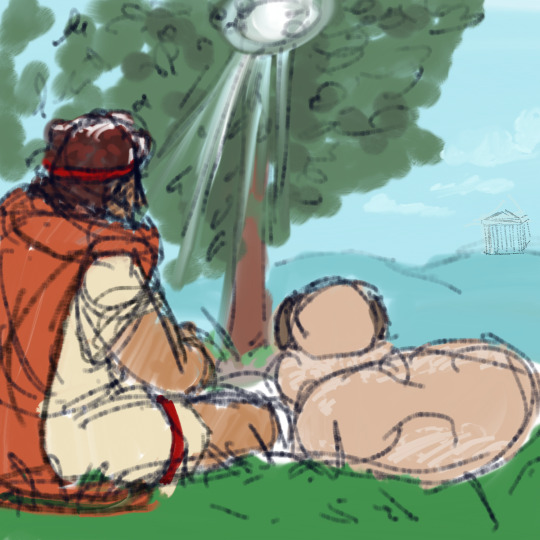
#a shepherd boy with his faithful companion#ancient greece inspired#<- because i've been listening to epic. read lots of greek mythology and see a lot of art of it lately#and I was last week on vacation in spain and have seen a lot of roman archaeological excavations#+ my uncle lives on a farm with hundreds of olive trees#and when I was sitting with Rambo (the dog) outside it gave me sheperd vibes lol#so I wanted to paint/draw that vision :)#also Rambo (while a sweetheart) is fucking huge and pretty clumsy + playful#so while it's been a week i have still his scratches on my leg but he's cute so I dont care#my uncle; I told you to be careful with him#me; but he's baby 🥺🥺 (he's still a pup)#anyways hope y'all like this WIP#digital wip#art concept#my art <3#my own post
1 note
·
View note
Text
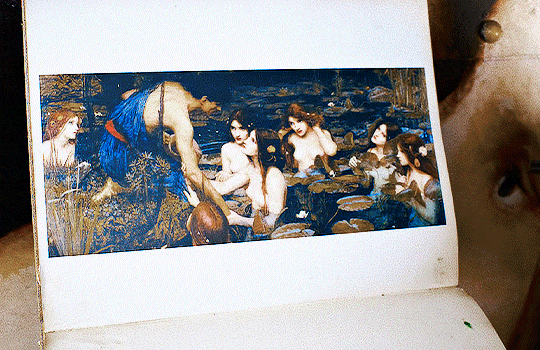
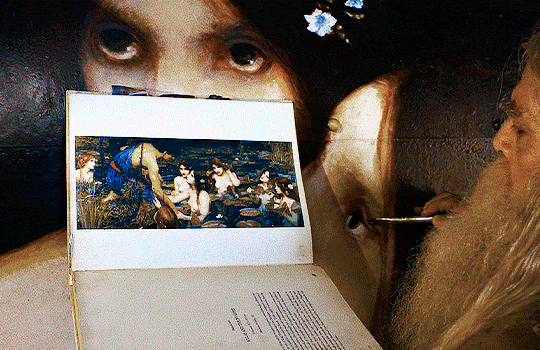

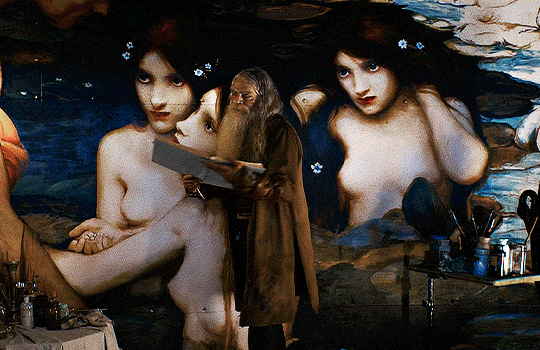
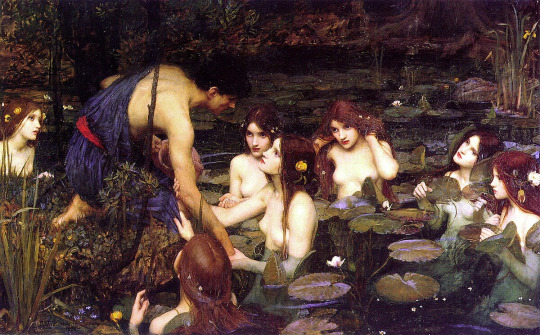
FURIOSA: A MAD MAX SAGA (2024) — dir. George Miller
The Guardian of Gastown, before he is alerted to Dementus’s approach, is in the midst of painting a large mural of John William Waterhouse’s breathtaking canvas Hylas and the Nymphs (1896). [...] As was the English painter’s practice, Waterhouse created the work after a Greek and Roman myth, in this case that of Hylas being lured by Naiads. The youth was a companion of Hercules and joined him on the Argo vessel on his quest to find the Golden Fleece. Along the way, Hylas was sent to fetch fresh water, encountered the nymphs, and never returned. But just like Waterhouse’s work, Miller’s Furiosa takes its cue from myth—albeit one of the filmmaker’s own making. The movie is dotted throughout with ancient Green and Roman touches, from Dementus’s motorcycle-driven “chariot” to the Trojan Horse-style attack on Gastown. Much like Hylas, the warlord’s fate is also shrouded in mystery. Above all is Furiosa’s own story, her emergence as a hero framed as the stuff of legends. “This is our destiny,” Dementus tells Furiosa at one point. “Do you have it in you to make it epic?" [x]
[id in alt]
#filmedit#madmaxedit#furiosaedit#furiosa: a mad max saga#2020s#action#*#by raffaella#cinemapix#fyeahmovies#junkfoodcinemas#filmtvtoday#mad max#userines#userchristineb#userstream#userchibi#useraurore#tusertyler#usergiles#usersaoirse#usersavana#userzo#userbarrow#userlau#usermimsi#tuservaleria
733 notes
·
View notes
Text
rewatching Thou Must Live Die and Know aka the best cutscene of all time for an art thing, I'm reminded that my favorite part of Endwalker wasn't any of the epic setpeice moments or heartrending drama, it's this one pause.
It's this scene where Venat is arguing with a group of Zodiark worshippers about to make a large sacrifice to bring back things as they were, Venat is arguing against them by saying that we have to accept sorrow as a constant companion rather than causing more sorrow by repeating the cycle of sacrifice. They don't listen, and continue insisting that the world before the Final Days was a perfect paradise. Venat listens to them silently for a moment, then draws her sword and preforms the Sundering.
But, that little pause, why she hesitates when they insist things were perfect - it's because she knows they weren't. At this point she's the only one who remembers Hermes's despair, knows that it's the cause of all this, knows that it was caused by his existential crisis over the abuse of creation magic. She knows the flaws in the Ancient world too, because she's seen people's confusion at her choice not to return to the star, as well as presumably seen other problems in her work helping others as Azem. There's a terrible tragic irony too in the fact that she was an outlier in the Ancient world for choosing to continue to live past the end of her duty but by becoming Hydaelyn she's bound to her duty for even longer.
182 notes
·
View notes
Text
Greek mythology books (nonfiction)
I was asked about this, so here are some books I like, in no specific order:
Early Greek Myth: A Guide to Literary and Artistic Sources by Timothy Gantz.
The Routledge Handbook of Greek Mythology by Robin Hard.
A Companion to Greek Mythology edited by Ken Dowden and Nial Livingstone.
The Cambridge Companion to Greek Mythology edited by Roger D. Woodard.
The Gods in Epic: Poets and Critics of the Classical Tradition by D. C. Feeney.
The Daily Life of the Greek Gods by Giulia Sissa and Marcel Detienne.
Greek Nymphs: Myth, Cult, Lore. by Jennifer Larson.
A new Companion to Homer edited by Ian Morris and Barry Powell.
The Cambridge Guide to Homer edited by Corinne Ondine Pache.
Homer's Divine Audience: The Iliad's Reception on Mount Olympus by Tobias Myers.
The Iliad – the Poem of Zeus by Pietro Pucci.
Zeus in the Odyssey by J. Marks.
Brill's Companion to Hesiod edited by Franco Montanari, Chr. Tsagalis and Antonios Rengakos.
•The Oxford Handbook of Hesiod edited by Alexander C. Loney and Stephen Scully.
Hesiod's Theogony: from Near Eastern Creation Myths to Paradise Lost by Stephen Scully.
The Hesiodic Catalogue of Women and Archaic Greece by Kirk Ormand.
The Hesiodic Catalogue of Women: Constructions and Reconstructions by Richard Hunter.
Hesiod and Classical Greek Poetry: Reception and Transformation in the Fifth Century BCE by Zoe Stamatopoulou.
The Greek Epic Cycle and its Ancient Reception: A Companion edited by Marco Fantuzzi and Christos Tsagalis.
The Tradition of the Trojan War in Homer and the Epic Cycle by Jonathan S. Burgess.
The Epic Cycle: A Commentary on the Lost Troy Epics by M. L. West.
The politics of Olympus : form and meaning in the major Homeric hymns by Jenny Strauss Clay.
Traditional Themes and the Homeric Hymns by Cora Angier Sowa.
The Homeric Hymn to Demeter: Translation, Commentary and Interpretive Essays edited by Helene P. Foley.
The Homeric Hymn to Aphrodite: Introduction, Text, and Commentary by Andrew Faulkner.
Orphic Traditions and the Birth of the Gods by Dwayne A. Meisner.
The Derveni Papyrus: Cosmology, Theology and Interpretation by Gábor Betegh.
The Derveni Papyrus: Unearthing Ancient Mysteries edited by Marco Antonio Santamaría Álvarez.
Chaos, Cosmos and Creation in Early Greek Theogonies: An Ontological Exploration by Olaf Almqvist.
When the Gods Were Born: Greek Cosmogonies and the Near East by Carolina López-Ruiz.
Mythica by Emily Hauser.
Women and Weasels: Mythologies of Birth in Ancient Greece and Rome by Maurizio Bettini.
Ancient Stepmothers: Myth, Misogyny, and Reality by Patricia A. Watson.
Gender and the Interpretation of Classical Myth by Lillian E. Doherty.
The Story of Myth by Sarah Iles Johnston.
Drakon: Dragon Myth and Serpent Cult in the Greek and Roman Worlds by Daniel Ogden.
Zeus by Ken Dowden.
Classical Zeus: A Study in Art and Literature by Karim Arafat.
Aphrodite by Monica S. Cyrino.
The Origin of Aphrodite by Stephanie Lynn Budin.
Entre ciel et guerre. Figures d’Aphrodite en Grèce ancienne by Gabriella Pironti.
The Hera of Zeus: Intimate Enemy, Ultimate Spouse by Vinciane Pirenne-Delforge and Gabriella Pironti.
Hermes by Arlene Allan.
Artemis by Stephanie Budin.
Apollo by Fritz Graf.
The Power of Thetis: Allusion and Interpretation in the Iliad by Laura M. Slatkin.
The Staying Power of Thetis: Allusion, Interaction, and Reception from Homer to the 21st Century edited by Maciej Paprocki, Gary Patrick Vos, David John Wright.
Athena by Susan Deacy.
Dionysos by Richard Seaford.
Perseus by Daniel Ogden.
Herakles by Emma Stafford.
The Oxford Handbook of Heracles edited by Daniel Ogden.
Heracles in Early Greek Epic edited by Christos C. Tsagalis.
Helen of Troy: Beauty, Myth, Devastation by Ruby Blondell.
Achilles in Love: Intertextual Studies by Marco Fantuzzi.
Medea by Emma Griffiths.
Looking at Medea: Essays and a Translation of Euripides’ Tragedy edited by David Stuttard.
Medea: Essays on Medea in Myth, Literature, Philosophy, and Art edited by James J. Clauss and Sarah Iles Johnston.
#if anybody has titles to add please do so#I might add others once I remember them#books#greek mythology#and ancient Greek literature in general
87 notes
·
View notes
Text

RVB OC WEEK! March 31st to April 6th
No obligation to use any prompt suggestions, or create something each day; only what you have the time, energy, and inspiration for. Have fun, and share your OCs how you want!
Day 1; Introduction (Monday, March 31)
Day 2; Red Team/Blue Team (Tuesday, April 1st- no April Fools jokes~)
Day 3; Project Freelancer and Charon Industries (Wednesday, April 2)
Day 4; A1/Robots and Other Worldly Creatures (Thursday, April 3)
Day 5; Chorus and Mercs (Friday, April 4)
Day 6; Relationships (Saturday, April 5)
Day 7; Energy Sword Sunday (Sunday, April 6)
More explanations for prompt suggestions below-
1- Introduction; name, backstory, general info. Unique OCs, self-inserts, and side characters who have been expanded on are welcome. A single OC or multiple are fine. Skills and abilities, weapons/special gear, designs with or without armor. Art, 3D models, dress-up game/icon makers, aesthetic/moodboards, playlists, text/writing all good examples
2- Red Team/Blue Team; Would they be with the Reds or the Blues we know, Flag Zealots, Temple's group of Blues and Reds, with a totally different set of Red/Blue teams, or "in the middle" like Doc (you can treat the scenario as an AU for your OC; what if they were in Blood Gulch from the beginning? What if it wasn’t your “real OC” with Temple’s group, but their alternate/look-alike?)
3- Project Freelancer and Charon Industries; for any OCs who are Freelancers, or OCs on Charon’s side. Maybe the OC isn’t part of the Freelancer program or directly involved with the Insurrectionists, but still interacts with them, such as scientists and pilots (if your OC isn’t officially part of it all, you can also use this suggestion as another AU or “what-if”)
4- AI/Robots and Other Worldly Creatures; for OCs who have an AI companion/interact with the AI, or perhaps ARE an AI. New AI Fragments, floating orbs/AI gods, robot OCs, or vehicles/ships with their own personality. OCs that are different kinds of space aliens/creatures, or any OCs that aren’t human. Again, this suggestion can be used as an AU/what-if, or show your OC with any characters who fit
5- Chorus and Mercs; would an OC be with the Feds or the News, friends with the Lieutenants or an assistant to Dr. Grey. Would they be part of the Mercenaries, either working with Felix and Locus or a different kind of space pirate, maybe they knew Sharkface from being trapped on the Tartarus, maybe they got stranded out here from another crash-landing
6- Relationships; for any dating/romantic ships, friends and close companions, QPR, polyamory, found-family/long-lost relatives/time-traveling ancestors/descendants, etc. OCs having relationships with existing characters or other OCs welcome. Creators can ask each other if OCs can be paired together~
7- Energy Sword Sunday; OCs who have "Great Keys", any ideas about how it was acquired/how it is used, activating unique temples/ancient technology, any quests or prophecies, or epic sword fights with other wielders
66 notes
·
View notes
Text
EA Press Release. [source link]
"Unite a Team of Heroes to Defeat Rampaging Elven Gods in Dragon Age™: The Veilguard Arriving in Fall 2024 June 09, 2024 Meet the Most Captivating Companions in the Franchise with New Cinematic Trailer; Official Gameplay Reveal with More Game Details Coming Tuesday, June 11 REDWOOD CITY, Calif.--(BUSINESS WIRE)-- Electronic Arts Inc. (NASDAQ: EA) and BioWare premiered a new cinematic trailer showcasing a brand new cast of companions who will join players in their journey through Dragon Age: The Veilguard, an all-new single-player fantasy RPG experience coming to PlayStation®5, Xbox Series X|S and PC in Fall 2024. Dragon Age: The Veilguardbuilds upon the pillars the iconic series is best known for, delivering a bold and heroic adventure guided by rich storytelling, fluid and strategic combat, companions and fellowship, and choices that matter. Tune into the official gameplay reveal of Dragon Age: The Veilguard featuring more than 15 minutes of gameplay from the opening moments of the experience on Tuesday, June 11 at 8:00 a.m. PT at the Dragon Age YouTube channel. In this next chapter of the critically-acclaimed saga, players will step into Dragon Age’snewest fully-customizable hero, Rook, battling on the front lines alongside an extraordinary cast of heroes known as the Veilguard. Fellowship is central to the experience of Dragon Age: The Veilguard, with each companion entering the fray with their own storylines, motivations and skill trees. In this tale that will decide the fate of Thedas forever, Rook must rise up, rally a team and forge relationships to become the unexpected leader others believe in. “Dragon Age: The Veilguardfeatures some of the deepest companion storylines in Dragon Agehistory, navigating romance, tragic loss and complex choices that will affect relationships with players and the fate of The Veilguard,” said John Epler, Creative Director of Dragon Age: The Veilguard. “BioWare’s storytelling roots shine through every chapter of this adventure, and we are incredibly excited for Dragon Age fans as well as those new to the series to experience this crafted, character-driven narrative that is so intertwined with our studio’s DNA.” Each companion in Dragon Age: The Veilguard brings their own expertise to the field of battle, summoning the grit to stand together and face impossible odds. Throughout their adventures, players can mix and match different team combinations of two of the game’s seven total companions at a time, to adapt to certain challenges and link powerful combinations that can turn the tide of any battle. The game’s cast of companions includes: Bellara, a creative and romantic Veil Jumper obsessed with uncovering ancient secrets. Davrin,a bold and charming Grey Warden who has made a name for himself as a monster hunter. Emmrich, a necromancer of Nevarra's Mourn Watch who comes complete with a skeletal assistant, Manfred. Harding, the dwarven scout, returns to the fray as a companion with her big heart, a positive outlook, and a ready bow – as well as unexpected magical powers. Lucanis, a poised & pragmatic assassin who descends from the bloodline of the House of Crows, a criminal organization renowned throughout Thedas. Neve, a cynic fighting for a better future, both as a private detective and a member of Tevinter's rebellious Shadow Dragons. Taash, a dragon hunter allied with the Lords of Fortune who lives for adventure and doesn't mind taking risks. Fans can add Dragon Age: The Veilguardto their wishlists on PlayStation, Xbox and PC via Steam and Epic Games Store. For additional information and to stay up to date on Dragon Age: The Veilguard, visit the official website, like Dragon Ageon Facebook, follow the franchise on Discord, TikTok, Tumblr, Instagram and X (formerly Twitter), and subscribe to its YouTube channel."
[source link]
#dragon age: the veilguard#dragon age: dreadwolf#dragon age 4#the dread wolf rises#da4#dragon age#bioware#video games#long post#longpost
174 notes
·
View notes
Text
If I Made An MMORPG
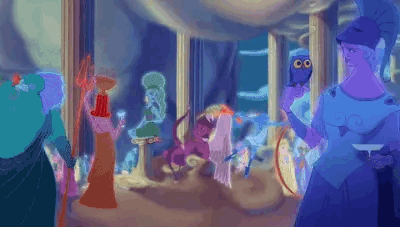
If I were to make an MMORPG type game, I think it'd be cool to set the game in Ancient Greece. Instead of classes, you choose a patron god from among the major Olympians (with room for big names like Persephone, Hecate, Hades, Hestia, and Pan so it's not JUST the official Olympians.) And instead of factions, you align yourself with one of the Ancient Greek City-States.
You are a demigod/hero representing your chosen God and fighting for the domination of your City-State. Whether this is a battle royal between many city-states, or it goes for a more Peloponnesian War thing with Athens vs Sparta. You can also meet and befriend both important figures from Greek history, as well as figures from Greek Myth like Helen of Troy and Odysseus.
For gear, you'd collect legendary items from Greek Mythology, such as Achilles' Armor, Medea's Cauldron, Heracles' Nemean Lionskin, Penelope's Shroud, Agamemnon's Shield of Phobos, Perseus' Mirrored Shield, and of course, more legendary equipment like the Golden Fleece, Hermes' Sandals, Aphrodite's Girdle, or Zeus' Aegis.
The god you pick is your class, so your chosen god affects your playstyle.
Ares, Artemis, Poseidon, and Zeus are Damage type gods.
Apollo, Demeter, Hecate, and Hestia are Support type gods.
Aphrodite, Dionysus, Hermes & Persephone are Control type gods.
Athena, Hades, Hephaestus, and Hera are Guardian type gods.
So, let's say you built your hero, and you want to swear your loyalty to Aphrodite. You're a Control type hero that uses love and beauty to stun and weaken foes. Your class-exclusive gear would include items like Harmonia's Necklace, The Apple of Discord, The Bow of Eros, and Aphrodite's Girdle. You'd then pick a City State, and the game would highlight the areas with strong ties to Aphrodite: such as Korinthia, Kythera, and of course, Athens and Sparta, but you can really pick anywhere. Finally, your main quest givers would be heroes like Adonis, Narcissus, and Aeneas. You could even unlock Epic heroes and gods as companions, with Aphrodite's Legendary ally being Eros.
Though there'd have to be measures to ensure the popular gods like Zeus, Apollo, and Athena aren't just going to steamroll over the players that picked Hestia.
Yes, I am aware of Smite: Battleground of the Gods, but that's a MOBA, not an MMORPG. Two very different genres. You're not building a character up from level 1 in a MOBA.
#greek gods#greek mythology#mmorpg#mmo gaming#game idea#greek pantheon#hellenism#ancient greece#greek myth#video game idea#video games#olympians#mount olympus#theoi#greek history#ancient history
30 notes
·
View notes
Text
Experience the Magic of Caves of Qud Full Release

Caves of Qud 1.0 for the science fantasy roguelike game launches on Linux, Steam Deck, Mac, and Windows PC. Thanks to the brilliant minds at Freehold Games for making it happen. Which you can find in full on Steam, GOG, and itch with 96% Overwhelmingly Positive reviews. Big news, friends – Caves of Qud 1.0 has officially launched. After 15 years of development, Freehold and Kitfox have brought their masterpiece to the finish line, coinciding with the PC Gaming Show: Most Wanted showcase. So, if you’ve been waiting for a reason to dive into this mind-bending science fantasy roguelike, it's out now on Steam Deck (verified) and Linux.
What’s New in Caves of Qud 1.0?
This isn’t just any update – it’s the ultimate update. So, here’s what’s packed into version 1.0:
A brand-new tutorial to help newcomers learn the ropes.
The final quest in the main story, completing the epic journey.
Fresh music tracks, immersive sound effects, and shiny new items.
A whopping 40 new achievements to conquer.
Tons of bug fixes and small improvements that make the gameplay smoother than ever.
Caves of Qud 1.0 - Official Trailer
youtube
Introducing the Dromad Deluxe Edition
The launch also brings the Dromad Deluxe Edition, a treat for true fans. It includes:
The full Caves of Qud experience.
A newly enhanced soundtrack to get lost in.
The Harvest Dawn DLC pack, featuring in-game companions to keep you company. This includes previously Patreon-exclusive pets and one adorable new addition that’s making its debut!
Why it's Worth Your Time
For those who don’t know, Caves of Qud 1.0 continues is a mix of science fiction, fantasy, and roguelike brilliance. Imagine a title where you can teleport, swap bodies with robots, hypnotize goats, while digging into 10,000 years of history. Whether you’re exploring ancient ruins or crafting your dream character with over 70 mutations and dozens of cybernetic implants, there’s always something to surprise you. Prefer a hardcore challenge? Dive into Classic mode with permadeath. Want to relax and soak in the story? Roleplay and Wander modes are also here for you. So it’s no wonder this title has been a staple on PC Gamer’s Top 100 list for years!
Get Ready to Explore
Caves of Qud 1.0 is out now for 25.49 USD / £21.24 / 24,64€ with te 15% launch discount on Steam, GOG, and itch. If you need one more reason to jump in, it’s the perfect time to jump into this world of endless possibilities. So, gear up, grab your companions, and prepare to lose yourself in the legendary Caves of Qud 1.0. The wait is over – so it’s time to carve your story into the bones of this extraordinary world on Linux, Steam Deck, Mac, and Windows PC.
#caves of qud#science fantasy#roguelike#linux#gaming news#freehold games#ubuntu#steam deck#mac#windows#pc#unity#Youtube
62 notes
·
View notes
Text
How Long Has It Been ... 4 Million Years
Words: 3018
Rating: General Audiences
Optimus Prime/Elita One, Chromia/Ironhide
My tribute to the Transformers 40th Anniversary and inspired by the amazing works of Jorge Rivera-Herrans Musical EPIC.
To "Would You Fall in Love with Me Again" of the Ithaca Saga of EPIC: the Musical.
I DO NOT OWN ANY OF THE MENTIONED SONG, CHARACTERS AND FRANCHISES AND PLEASE, PLEASE LISTEN AND/OR WATCH EPIC: the Musical IF YOU HAVEN'T SEEN IT YET! ITS AMAZING. The scene written has no set Transformers Fandom, just my own version.
The great war is over and Optimus Prime and many Autobots return to Cybertron with all they had promised. Many welcomed them home with joy, however some have not. Yet, this was not Optimus' concern, he can deal with the negativity from multiple bots, however only one bot's opinion matters to him above all.
After 4 million years Optimus and Elita One would reunite, yet would all that time away have faded their bond and would Elita accept who Optimus had become?
I made a few tweaks in the lyrics to make it more accurate to the characters.
Once you see this "#", you can start playing the song, "Would you Fall in Love with Me Again." Make sure you read the full story first to get an idea of how each scene plays out in the song.
All rejoiced that the war was finally over. All factions could return home to Cybertron, the world they had to abandon. Relations were reforging in many forms, some bad, most are good, and a few are much better. They had praised the Autobots and their Prime for their victory and welcomed them home with gratitude and glory.
Yet, a tension still creeped in the celebrations with the victorious bots.
Cybertron 20XX, Iacon (Currently under restoration.)
The group of returning Autobots drove through the wrecked terrain of their former home world. With Optimus in the lead, his vanguard and staff behind him, and their human companions, Spike and Carly Witwicky, in between them while riding within Bumblebee. They followed the blue warrior and vanguard of the Cybertronian Resistance, Chromia. Each of the Autobots had feelings of longing, regret, fear, and resignation of the chaos that lay before and beyond their sights. Most knew the restoration, since Earth’s discovery of an energon deposit on one of Saturn's moons, had relieved tension of starvation to their planet. However, the scars of war ran deep for both warring factions and would take a very long time to heal.
A taste of resentment hung in the air despite welcoming celebrations, when the Ark finally returned to Cybertron with the needed energon and reinforcements. This resentment was not just at former Decepticons, Autobots, and Neutrals to each other, but also at the returning Prime who made a promise of said return. Which he did keep, but they felt he had come so late and few felt that he and the promised relief was not needed. A campaign was held by one small group for the Autobots to leave Cybertron and be accountable for the war at the spaceport. One former noble mech tried to take a shot at the visiting humans for being disgusting Organics that took Cybertron’s needed resources from them. It had been broadcasted how humanity was integral to their home world’s revitalization, but many weren’t fully accommodating to it. Only Prime’s orders, and all the strongest bots, had to restrain Bumblebee, Arcee, Hound, and even Prowl from doing anything rash to retaliate.
If Optimus was offended or remorseful at all the negative feedback at him, he didn’t show it. He knew he would face this to some extent when the war was over, the matrix of leadership kept his processor running without the burden of self-doubt and professionalism in his role. Part of the perks of having an ancient artifact filtering emotions and grants wisdom.
He gave a heartfelt speech to the hostile crowd and was able to deescalate the situation from boiling over when Chromia arrived. Seeing the vanguard of the resistance, the protester crowd dispersed not wanting to anger who they considered a “true hero”; Optimus stopped an outraged Hot Rod at that. After getting a debrief of events and planning from Chromia she informed them that Elita One was waiting to speak to Optimus. She stated that it was about how to proceed forward with restorations and try to reestablish relations with all Cybertronians and colonies. Whatever opinions Chromia had of her own about the Autobots and Prime, she kept to herself, especially when Ironhide tried to talk to her. She wasn’t being coarse with him, just setting where their priorities should lie, but she did tell Ironhide she’ll talk to him when appropriate.
Now, the group of returned Autobots followed Chromia down the broken paths of Iacon to an area that Optimus knew very well, the old apartments of the docks. In the short distance, the restored Iacon Archives, where he as Orion would go on his day off and read despite his class level back then. Past memories were quickly repressed by the matrix when the group came to an old ruined single floored building. The luster of its chrome finish lost with time, with walls that had crumbled into rubble, and the entrance door missing one side, but to Optimus, he was finally home. Chromia stopped in front of them and announced they had arrived at their destination and all of them transformed into bot mode, with Bumblebee letting his friends out beforehand.
Optimus wasn’t surprised Elita was here of all places, but the meaning as to why she was didn’t escape his mind. He had kept his promise, but was it worth it for her? Ordering his men to wait outside with the humans, Optimus tentatively approached the door.
“Understand this, Optimus Prime,” said Chromia with no emotion in her voice. Optimus stopped to look at her. “It may have been a few years for you, but it was millennia upon millennia for us.”
She tightened her grasp on the spear she carried, still looking blankly back at the path they traversed. Of a still ruined city she had witnessed fall, had fought in, and was now seeing real progress of returning life.
“We know that you tried and moved as quickly as possible to return our hope. But it was a long, long, and grueling time for us. For her. Some feelings.” She looked to Ironhide, who had a resigned look on his face. “Can fade with time.” She looked away from her Conjunx Endura back to her Prime with a sad smile. “Yet, despite all we faced she still let out hope of your return. Please, don’t squander it.”
From there, she headed toward the group and stood in front of Ironhide, who gave her the same sad smile back at her. After a few soft words, they walked off together to have their own private talk. The group remained back as their Prime walked forward to the building and opened the only door left wide open.
This was supposed to be a private meeting, a long awaited reunion, but all those involved wanted everything to be said in the open and out to all present.
When they first arrived Bumblebee gave the humans a short summary of what was going to happen. The Witwicky couple felt unsure they should stay but a kind word from Prowl and Ratchet let them know that they were just as welcomed for this. Feeling awkwardly honored, Carly stood with Spike, holding his hand nervously, as they watched the Prime stop at the door to the building, with an equally nervous looking Bumblebee. They stayed silent as to not add to the tension, yet…
“I keep forgetting,” Spike quietly mentioned. Carly looked at him, his face had a look of sadness and understanding. “They've lived much longer than us. Our perception of time is so different from theirs. Four million years, a long time to us, longer than our species' existence, but how was it for those here on Cybertron? Constantly fighting, forging, and preserving their culture? They've all waited so long for Prime and the others to return home and most of that time Prime was offline after their crash and defending Earth.” Spike lowered his head, his voice trembled slightly. “But for the Bots here, for Elita One, she kept waiting for Prime. How could they–”
“Hey,” Carly interrupted. Her husband looked back at her, and she smiled slightly at him. “Let's just watch and see what happens for right now, because this is something they have to settle themselves. Everything else can come later.” Carly leaned into him, both of them giving each other a one-sided hug. They watched as Prime slowly moved forward.
Before entering, Optimus looked upon his reflection in the tarnished chrome mirror of the door. To him, there was no regal Prime returning home with honor and glory looking back. He saw all the dirt, the grime, the scratched paint, and the scarred metal of his body. He looked into his optics, though they are not like human eyes, he could see the tiredness, the past sorrows, the distress and regrets. More prominently, he saw the age in them. He was not coming in at his best, yet despite his current sorry state, Elita One fought for the home he left behind for far longer. He had no right to compare himself to her. He forced the Matrix of Leadership to release their filter on his inner spark, he will not let repression and old wisdom deny him emotional release. The Prime didn’t know what would be discussed, but he was ready for every harsh full criticism of his choices and mistakes. He will face his comeuppance at the one who fully deserved setting it to him.
He took one last inhale, and let it go with the name he had thought he would never say with such a hopeful tone again. #
“Elita…”
The room of his former life, while ruined, still held most of the furniture he had precious memories of. The war had destroyed most of the walls, only a few were still standing while everything else had toppled and left the building fully open to the scenery of all Iacon city levels and the horizon of their home world. The sun of their solar system was already rising.
There she stood, a statue of a fury rose color that contrasts the rising dawn over the far horizon, her back to him. At the moment he said her name, she turned to him with the same tired yet hopeful eyes looking back. At the mech of scuffed red and blue, who she hadn’t seen for 4 million years.
“Is it you?” Elita asks with folded arms across her front, looking at him with judging eyes.
“Have my prayers been answered?
Is it really you standing there,
or am I dreaming once more?”
She looked at the mech, at all his scars and wear.
“You look different, your optics look tired
Your frame is lighter, your mask torn.
Is it really you, my love?”
After a moment, Optimus looked down to his hands, at the hands that may have saved many, yet also took away many.
“I am not the mech you fell in love with,
I am not the mech you once adored.”
He looked back up at her with defeat in his voice.
“I am not your kind and gentle Endura,
And I am not the love you knew before.”
Optimus took a tentative step towards the Conjunx he left behind placing his worn hands upon his frame where his spark lay.
“Would you fall in love with me again,
If you knew all I've done?
The things I cannot change,
Would you love me all the same?
I know that you've been waiting, waiting for love.”
Elita looked at Optimus with an uncertain look and turned away from him, her profile silhouetted by the rising sun. “What kinds of things did you do?”
Optimus knew what words to say and said them without hesitation, letting each sentence form the memory it depicted.
“Left a trail of red on every planet.”
The memories appear of Cybertronians displaying a Decepticon or Autobot sigil littering many battlegrounds as Optimus fought Megatron. Cutting down the tyrant's followers with his energy axe.
“As I traded friends like soldiers I could use.”
Times in before and during the war, Optimus formed great friendships and careful recruiting to the ranks. Sadly, many had faced their death in battle under his orders or from blind loyalty. He never should have involved them, he always mourned.
“Hurt more lives than I can count on my hands.”
Battles on Earth showed the Prime the true extent of their growing war. Visons of city or rural battles, where Humans tried to run, hide, or even fight against the Decepticons alongside the Autobots when they got caught in the crossfire. Sometimes he dreams of the screams of those he couldn’t save as debris fell.
“But all of that was to bring me back to you.”
He raises his helm to look back at her with surprising strength and voices his longing. He held a hand out to her to take.
“So, tell me.
Would you fall in love with me again,
If you knew all I've done?
The things I can't undo.”
Optimus seemed to wilt with regret.
“I am not the mech you knew,
I know that you've been waiting, waiting.”
Elita’s voice interrupted him as she looked to contemplate his words.
“If that's true, could you do me a favor?” She looked at him with a calm stern look.
“Just a moment of labor,” she then pointed to her right. “That would bring me some peace.”
Optimus followed the direction, blinking at the sight of a bed made from a Founding Crystal Tree, a special type of living crystal that only grew and formed from right where it was planted. The very one where they had first met long before the war, long before Megatron, when they were only just Ariel and Orion.
“See that bonding bed? Could you carry it over?
Lift it high on your shoulders and take it far away from here.”
Elita threw her hand out toward the exit dismissively.
Optimus looked back at her, shocked at her challenge.
“How could you say this?
I had built that bonding bed with my fuel and mesh.
Carved it into the crystal tree where we first met,
A symbol of our love everlasting.”
His anger started to rise, gesturing at her then to the bed with an angry pointing digit.
“Do you realize what you have asked me?
The only way to move it is to cut it from its roots.”
Outraged, Optimus turned and started to walk away, refusing the request, knowing by doing so would end with his broken spark.
“Only my Conjunx knew that!”
He froze at her affirming tone.
“So, I guess that makes him you!”
Optimus slowly looked back at Elita, who now stood straight and confident in her claim. He turned shocked at her, his earlier anger gone, and hope filled his unfiltered spark.
“Elita…”
Elita One, leader of the Cybertron resistance, slayer of spark eaters, last beacon of hope on Cybertron, and Conjunx Endura to Optimus Prime looked at him with fierce blue twin pools. She began a slow walk toward him, each step she took added to the affirmation in her reply.
“I will fall in love with you over and over again
I don't care how, where, or when.”
As she got closer, she gestured at him with a stern digit.
“No matter how long it's been, you're mine.
Don't tell me you're not the same person!”
Elita swept her arm out, throwing his earlier said claim aside.
The passion in her voice seemed to resonate with their world, their universe, and all other universes in existence, as if to challenge all of them that their love still exists.
“You're always my Conjunx and I've been,
Waiting…”
In a universe of origin, a different Optimus and Elita are reaffirming their affection and purpose to each other outside a large dome structure of their home world.
“Waiting…”
In another, two Autonomous Robotic Organisms are fighting their own battles, one decapitating his traitorous mentor, while the other tries to find her purpose.
Optimus' voice joined with hers to slowly match her passion and walked to meet her.
“Elita…”
“Waiting…”
A different Earth with a city called Detroit, a Prime regrettably fights against his former friend, who attacks him with long legs and poisoned fangs.
“Waiting…”
A planet of cold victory, a broken Optimus says goodbye to a glowing ethereal ghost of Elita who reassures her love to him.
“Elita…”
“Waiting…”
A different Cybertron, Elita tries to stop Optimus from destroying Earth’s Energon that she tried to steal. Desperately holding his gun as it shakes with his sorrowful choice.
“Waiting…”
A dying Elita comforts a distraught Optimus as he aims a glowing blaster at his former gladiator friend, who laughs mockingly while saying it’s the Prime’s own failure.
“Waiting…Oh!”
On the surface of a Cybertron, Elita One encourages Orion Pax to rescue their people from a false Prime.
Optimus stood still as Elita stood directly in front of him. She raised her hand to his face as he retracted his mask to show her his scared face and tired loving optics.
“For…”
He leaned into her warm hand, as she looked back at him lovingly.
“...you.”
Optimus broke into tears and embraced her, and Elita did the same with equal ferocity. Both wept and tugged at each other letting so many millennia of separation melt with each second.
All that time, all their companions had approached the building entrance and watched their reunion with sad but happy tears. Ratchet, Blur, Arcee, and even Hot Rod, let their tears flow softly. Jazz and Bulkhead wept loudly as the normally stoic Prowl comforted them by patting them on their helms while secretly fighting his own tears. Spike gave Carly her own handkerchief as they both tried to dry their crying tears while they both embraced each other warmly. Simultaneously, Spike patted reassuringly on a bawling Bumblebee’s leg. Ironhide, after having come back from his own conversation with Chromia, was wiping his whole arm across his optics as he wept, complaining how they were all acting like sparklings. Chromia gave him a small teasing bump on his shoulder as she tearfully smiled, relieved of her friend’s happiness.
No one said a word as their two leaders continued their reunion, at one point Optimus lifted Elita up in their hug and twirled her around, her laughing at the absurdity of the action. After a moment, he set her back down and they finally separated just enough to look deeply at each other.
With all the dirt and grime of years of separation and war, tired, but no longer burdened with a love no longer buried.
Elita looked back at him with a soft smile.
“How long has it been?”
Optimus smiled back.
“4 million years…”
They both settled in their embrace.
“I…I… love...”
Their helms reached to nuzzle each other, their optics closing.
“You.”
To just enjoy the moment of togetherness at last, not as leaders, not as Optimus Prime and Elita One, or as Orion and Ariel, but two lost sparks finally together as one.
--
'Hands over a tissue box': Need a tissue? Because I needed 60 while listening to the song every time I write, rewrite, edit and re-edit, and review and re-reviewed this story. Primas!
Hope you enjoyed it, and if anyone can recommend an artist or if yourself wants to draw this story as a comic or animatic please leave info in the comments and we could work something out. Thank you. Happy New Year!
Added notes A) Having a filter from the Matrix of Leadership was inspired from another story on Ao3, "Not a Prime Situation" by CarlottaPrime. You should also read it as well, real hard look at what Prime would be like without the Matrix of Leadership.
B) if you want to know the order of scenes-based media in the "waiting part", also it's not in chronological order, its: 1. G1,
2. Bayverse Movies,
3. Animated,
4. War for Cybertron Trilogy,
5. Skybound,
6. TF:Prime (My own Implied Head-canon),
7. Transformers One
#transformers#optimus prime#elita one#oplita#Chromia#Ironhide#maccadam#Maccadams#jorge rivera herrans#epic the musical#epic the ithaca saga#ao3 writer#songfic#More story than song#tfa#transformers animated#wfc#transformers wfc#transformers war for cybertron#war for cybertron trilogy#transformers one#skybound transformers#skybound#blackarachnia#g1#transformers g1#tf g1#would you fall in love with me again
45 notes
·
View notes
Text
as someone who only got into dragon age this year cause i got inquisition for free on epic games, i'm just curious why solavellan is so popular.
i mean i've only done one playthrough of inquisition and solas was probably one of my least favorite companions so i wonder why so many seem to love him. maybe it's something specific about his romance plot that's enchanted people or maybe it's like the tragedy of loving some guy who turns out to be like an ancient elven god who wants to "restore the world to how it once was" and has to basically kill everyone in order to do so (could 100% be misremembering something)
(also i don't mean this as an attack on solavellan shippers, just throwing questions out into the void)
#dragon age#dragon age inquisition#dai#datv#dragon age the veilguard#solas#solavellan#feel free to enlighten me!#also really excited for veilguard just hope i can run it on my pc#my posts
69 notes
·
View notes
Text
I completed the epic crossover!
Happy Valentine's Day! I didn't have time to prepare anything special for this wonderful day... but the Odyssey was a huge love story of Odysseus and Penelope. I hope that counts!
this is a crossover between "epic the musical" by Jorge Rivera-Herrans and Darqx characters (variations from Hedone High and Battle Priest)!
Part 1 (you are here), part 2, part 3, part 4...

.D in a slightly modified role of Penelope and little Marcus in the role of 12-year-old Telemachus. Marcus sits in the palace and fantasizes about the adventures of the King of Ithaca, while his tutor (actually he's Izm's first warrior) scolds him for sitting on the edge of the stairs
Disclaimer!
I have to point out that this crossover is made purely for fun and nothing more! (〃゚3゚〃)
I just thought it would be fun to move characters into the musical! In addition, I was inspired by the retelling of Greek myths, including the Odyssey, as described in Nikolai Kun's book "Legends and Myths of Ancient Greece"
there may be spoilers for the musical! if you wanted to check out this work, then check it out now, because my retelling is based on its plot too, not only original Odyssey!
Content and trigger warning! the work may contain themes of death and violence, as in the original work
I remove some things, I change some things to better suit the canon of the characters. + In the original Odyssey there were strange erotic moments that look wild today, in some places the myths in questions of character relationships diverge greatly, and in the musical a couple of times there is an erotic subtext that may look good in the plot or as a joke, but I refuse to adapt it
+ I just have a premonition of some questions like "in the musical it was like this..", "but in the original Odyssey it was like this, so it's like this in this crossover too?"
If I take everything from Epic or the original Odyssey, then Rire will have 92 children, and Caleb Donahue will be Grimshaw's biological son xDD
THANKS FOR YOUR ATTENTION!
BACK TO VIEWING CONTENT(~ ̄³ ̄)~↓

(Song "open arms" – epic the musical) In this crossover, Odysseus is played by Izm, and Ren becomes his loyal companion Polites.I skipped the trip to Troy, so here they are on the island of the Cyclopes. They have just discovered a cave with sheep!

Zeke is also here, playing the role of Eurylochus, Izm's second close friend. as you can see, soon he will become the only friend, because they met Polyphemus..
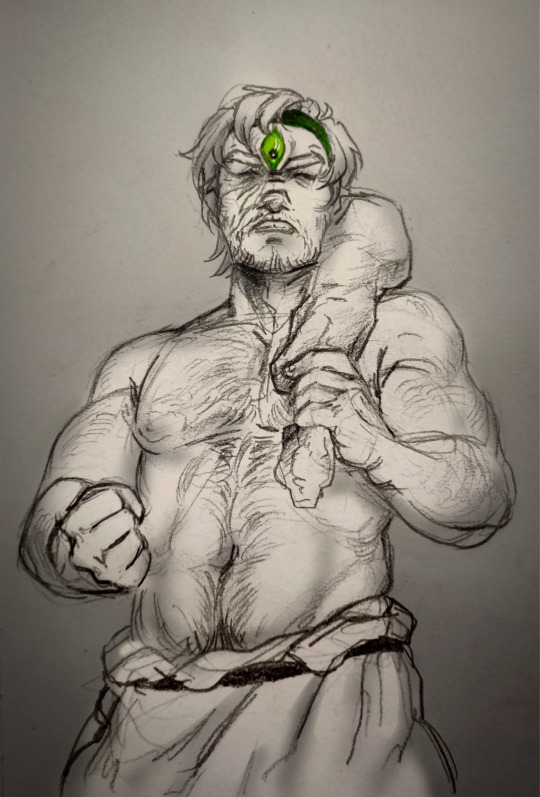
"You came to my home to steal, But now you'll become my meal" (song "Polyphemus" – epic the musical)
In the Cyclops' cave, the King of Ithaca experiences serious losses among his comrades for the first time. During the 10 years of war in Troy, he did not lose a single warrior thanks to good strategies, but once here, cunning no longer plays into his hands. According to the plot, it is here that Odysseus's faithful comrade, Polites, dies.

"Keep your friends and your enemies closer! Never really know who you can trust!" (Song "keep your friends close" – epic the musical)
The heroes successfully escape, but a strong storm overtakes them. Odysseus asks the god of the wind for help, to which he offers to play a game: he gives the bag with the storm to Odysseus, and he must keep it closed until the end of the journey.
What a simple task! But when Odysseus again stepped on the ship with this bag, a rumor immediately spread that this was treasure.
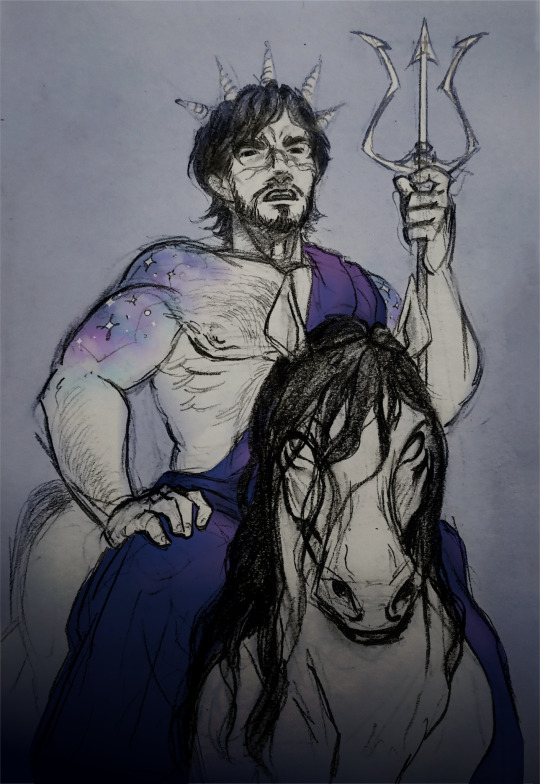
At night, when Odysseus fell asleep, one of his warriors stole the bag and opened it. A storm broke out and carried the ship far from the waters of Ithaca... Right into the hands of an enraged Poseidon! (I already posted this art, but I'll duplicate it)

"43 left under your command..." (song "Ruthless" – epic the musical)
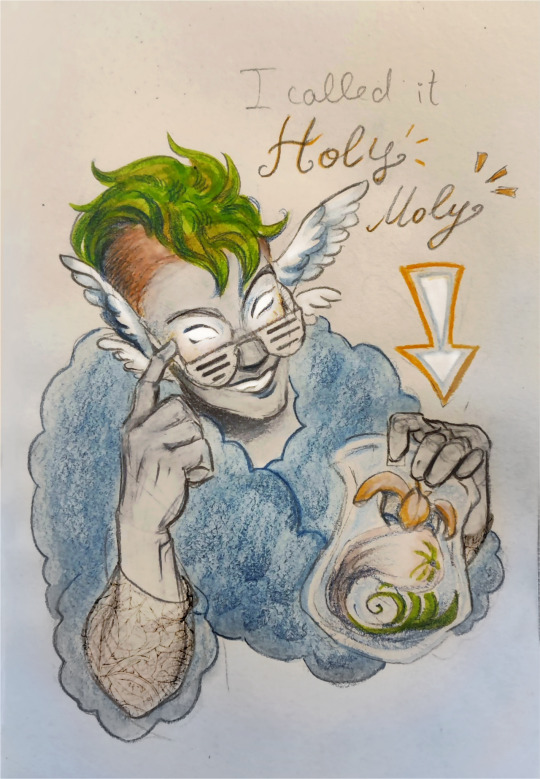
"Wouldn't you like to have some of the magic?" (song "wouldn't you like" – epic the musical)
the remaining crew is thrown onto the island of a mysterious sorceress.
The first visit to her palace for the warriors was unsuccessful - part of the group was turned into pigs. Hermes comes to help Odysseus save his comrades, who offers the king to try a magic plant. It will give him magic and the strength to resist the sorceress's curse. and yes, Hermes is played by Desmond (they have similar vibes, I think!)
continued in the next parts!
P.s.
why such a big disclaimer?
Firstly, I didn't expect to create so much content in a month. This can be mistaken for an important project, although it is not (I planned that this crossover would be very small, literally 2-3 sketches.. but i was wrong hehe :p)
Secondly, I have been in situations where my ideas were taken, but I was not credited as the author of the idea or the author of the Art (Not hehe :c). I understand how unpleasant this can be for the reader and for the author, so I want to immediately state that my crossover is a crossover for a reason! It is the intersection of two independent works, and I am just a small fan
#sketch#silly doodles#darqx#hedone high#crossover#epic the musical#epic crossover#I apologize for the many words#but i hope you like it
31 notes
·
View notes
Text
About Tanit
I recently posted about how people should be looking more into other gods outside of the Greco-Roman pantheons. If you follow me for quite some times, you will also have noted I posted a bunch of loose translation from the French Dictionary of literary myths (which is truly a great reference). Well, I wanted to share with you today a loose translation – well, more of an info-mining at this point – of an article about a goddess that people often ignore the existence of, despite being located right next to Ancient Greece and Rome, and being involved in the history of the Roman Empire. And this goddess is Tanit.
Written by Ildiko Lorinszky, the article is organized in two – at first it takes a look and analysis at the mythological Tanit, at who and what she likely was, how her cult was organized all that. The second part, since it is a Dictionary of LITERARY myths, takes a look at the most prominent and famous depiction of Tanit in French literature – that is to say Flaubert’s famous Salammbô. (If you recalled, a long time ago I posted about how a journalist theorized in an article how Flaubert’s Salammbô was basically an “epic fantasy” novel a la Moorcock or Tolkien long before “fantasy” was even a genre)
Part 1: Tanit in mythology and archeology
Tanit was the patron-goddess of the city of Carthage. Considered to be one of the avatars o the Phoenician goddess Astarte, Tanit’s title, as found on several Punic engravings, was “The Face of Baal” – a qualification very close to how Astarte was called in Sidon and Ugarit “The Name of Baal”. These titles seem to indicate that these two goddesses acted as mediators or intermediaries between humanity and Baal.
Tanit is as such associated with Baal, the vegetation god, but sometimes she is his wife, other times she is simply his paredra (companion/female counterpart). She seems to be the female power accompanying the personification of masculinity that is Baal, and as such their relationship can evoke the one between Isis and Osiris: the youthful sap of the lunar goddess regularly regenerates the power of the god. This “nursing” or “nourishing” function of Tanit seems to have been highlighted by the title she received during the Roman era: the Ops, or the Nutrix, the “Nurse of Saturn”. Goddess of the strengthened earth, Tanit is deeply tied to agrarian rituals: her hierogamy with Baal reproduces in heaven the birth of seeds on earth. Within the sanctuaries of Tanit, men and women devoted to the goddess practiced a sacred prostitution in order to favorize the fecundity of nature. The women tied to the temple were called “nubile girls”, while the men working there were called “dogs” to highlight how completely enslaved they were to the goddess. We know that the prostitutes of both sexes brought important incomes to the temple/
The etymology of Tanit (whose name can also be called Tannit or Tinnit) is obscure. The most probable hypothesis is that the Phoenico-Punic theonym “Tnt” is tied to the verb “tny”, which was used in the Bible to mean “lamenting”, “wailing”, “crying”. According to this interpretation, the “tannît” is originally a “crier”, a “wailer”, and the full name of Tanit means “She who cries before Baal”. As such, the Carthaginian goddess might come from a same tradition as the “Venus lugens”.
According to some mythographers, Tanit (or Astarte) was the supreme goddess of Carthage, and might have been identical to the figures of Dido and Elissa. As in, Dido was in truth the celestial goddess, considered as the founder of the city and its first queen. According to this hypothesis, the suicide of Dido on a pyre was a pure invention of Virgil, who took this motif from various celebrations hosted at Carthage. During these feasts-days, images and depictions of the goddess were burned The word Anna would simply mean “clement”, “mild”, “merciful” – the famous Anna, sister of Dido, is thought to have been another Punic goddess, whose cult was brought from Carthage to Rome, and who there was confused with the roman Anna Perenna, a goddess similar to Venus. Varro claimed that it was not Dido that burned on the pyre, but Anna, and according to this angle, Anna appears as a double of Dido – and like her, she would be another manifestation of the goddess Tanit. Anna’s very name reminds of the name “Nanaia”/”Aine”, which was a title given to Mylitta, yet another manifestation of Tanit.
The sign known as the “sign” or “symbol of Tanit” seems to be a simplified depiction of the goddess with her arms open: it is a triangle (reduced to a trapezoid as the top of the triangle is cut) with an horizontal line at its top, an a disc above the horizontal line. This symbol appears throughout the Punic world on monuments, steles, ceramics and clay figurines.
Part 2: The literary Tanit of Flaubert
Gustave Flaubert’s novel Salammbô is probably where the goddess reappears with the most splendor in literature. While her essence is shown being omnipresent throughout the Punic world, Tanit, as the soul of the city, truly dwells within the town’s sanctuary, which keeps her sacred cloak. The veil of the goddess, desired by many, stolen then regained throughout the plot, plays a key role within the structure of this very enigmatic text, which presents itself as a “veiled narrative”.
The town and its lands are filled with the soul of the “Carthaginian Venus”. The countryside, for example, is filled with an erotic subtext, sometimes seducing, sometimes frightening – reflecting the ambiguity of the goddess. The landscape is all curves, softness, roundness, evoking the shapes of a female body – and the architecture of both the city-buildings and countryside-buildings are described in carnal ways. Within Salammbô, Flaubert describes a world where the spirit and the flesh are intertwined – the female world of Carthage is oppressed by an aura mixing lust with mysticism; and through the erotic nature creeps both a frightening sacred and an attractive morbidity. For death and destruction is coming upon Carthage.
The contradictory nature of the goddess appears as early as the very first scene of the novel, when the gardens of Hamilcar are described. The novel opens on a life-filled landscape: the gardens of the palace are a true Land of Eden, with an abundant vegetation filled with fertility symbols. The plants that are listed are not mere exotic ornaments: they all bear symbolic and mythological connotations. The fig-tree, symbol of abundance and fecundity ; the sycamore, “living body of Hathor”, the tree of the Egyptian moon-goddess ; the grenade, symbol of fertility due to its multiple seeds ; the pine tree, linked to Attis the lover of Cybele ; the cypress, Artemis’ tree ; the lily, which whose perfume was said to be an aphrodisiac ; the vine-grapes and the rose… All those plants are linked to the moon, that the Carthaginian religion associated with Tanit. Most of these symbols, however, have a macabre touch reflecting the dark side of the goddess. The cypress, the “tree of life”, is also a funeral tree linked to the underworld ; the coral is said to be the same red as blood, and was supposedly born from the blood-drops of Medusa ; the lily symbolizes temptation and the unavoidable attraction of the world of the dead ; the fig-tree just like the grenade have a negative side tied to sterility… The flora of this passage, mixing benevolent and malevolent attributes, already depict a world of coexisting and yet opposed principles: fertility cannot exist without sterility, and death is always followed by a renewal. The garden’s description introduces in the text the very cycles of nature, while also bringing up the first signs of the ambivalence that dominates the story.
The same union of opposites is found within the mysterious persona of Tanit. The prayer of Salammbô (which was designed to evoke Lucius’ lamentations to Isis within Apuleius’ Metamorphosis) first describes a benevolent goddess of the moon, who fecundates the world : “How you turn, slowly, supported by the impalpable ether! It polishes itself around you, and it is the movement of your agitation that distributes the winds and the fecund dews. It is as you grow and decrease that the eyes of the cats and the spots of the panthers lengthen or shrink. The wives scream your name in the pains of labor! You inflate the sea-shells! You make the wines boil! […] And all seeds, o goddess, ferment within the dark depths of your humidity.” As a goddess presiding to the process of fermentation, Tanit is also tied to the principle of death – because it is her that makes corpses rot.
The Carthaginian Venus appears sometimes as an hermaphrodite divinity, but with a prevalence and dominance of her feminine aspect. Other times, she appears as just one of two distinct divinity, the female manifestation in couple with a male principle. Tanit synthetizes within her the main aspects of all the great moon-goddesses: Hathor, Ishtar, Isis, Astarte, Anaitis... All are supposed to have an omnipotence when it comes to the vegetal life. Mistress of the elements, Tanit can be linked to the Mother-Earth : for the character of Salammbô, the cloak of the goddess will appear as the veil of nature. The daughter of Hamilcar is linked in a quite mysterious way to Tanit – for she is both a frightened follower of the goddess, and the deity’s incarnation. Described as “pale” and “light” as the moon, she is said to be influenced by the celestial body: in the third chapter, it is explained that Salammbô weakened every time the moon waned, and that while she was languishing during the day, she strengthened herself by nightfall – with an additional mention that she almost died during an eclipse. Flaubert ties together his heroine’s traits with the very name “Salammbô”, which is a reminiscence of the funeral love of Astarte: “Astarte cries for Adonis, an immense grief weighs upon her. She searches. Salmmbô has a vague and mournful love”. According to Michelet’s explanations, “Salambo”, the “love name” of Astarte, is meant to evoke a “mad, dismal and furious flute, which was played during burials”.
As a character embodying Tanit, Salammbô is associated with the two animals that were sacred to the goddess: the holy fishes, and the python snake, also called “the house-spirit”. Upon the “day of the vengeance”, when Mâtho, the scape-goat, is charged with all the crimes of the mercenaries, she appears under the identity of Dercéto, the “fish-woman”. The very detailed costumes of Salammbô contain motifs borrowed to other goddesses that are avatars of Tanit. By using other goddesses, Flaubert widens the range of shapes the lunar goddess can appear with, while also bringing several mythical tales, whose scattered fragments infiltrate themselves within the novel. When she welcomes her father, Salammbô wears around her neck “two small quadrangular plates of gold depicting a woman between two lions ; and her costume reproduced fully the outfit of the goddess”. The goddess depicted here is Cybele, the passionate lover of Attis, the young Phrygian shepherd. This love story that ends in mutilations bears several analogies with the fatal love between Salammbô and the Lybian leader. And the motif of the mutilation is one of the key-images of the novel.
A fish-woman, like Dercéto, Salmmbô is also a dove-woman, reminding of Semiramis ; but more so, she is a snake-woman, linked mysteriously to the python. Before uniting herself with Mâtho (who is identified to Moloch), Salammbô unites herself with the snake that incarnates the lunar goddess in her hermaphroditic shape. It is the python that initiates Salammbô to the mysteries, revealing to Hamilcar’s daughter the unbreakable bond between eroticism and holiness. In the first drafts of the novel, Salammbô was a priestess of Tanit, but in the final story, Flaubert chose to have her father denying her access to the priesthood. So, she rather becomes a priestess under Mathô’s tent: using the zaïmph, she practices a sacred prostitution. The union of Hamilcar’s daughter and of the leader of the mercenaries reproduces the hierogamy of Tanit and Moloch.
Salammbô, confused with Tanit, is also victim of the jealous Rabbet. Obsessed with discovering the face of the goddess hidden under the veil, she joins the ranks of all those female characters who curiosity leads to the transgression of a divine rule (Eve, Pandora, Psyche, Semele). And, in a way, the story of Mathô and Salammbô reproduces this same story: the desire to see, the desire for knowledge, always leads to an ineluctable death.
#tanit#astarte#punic goddess#carthaginian goddess#carthage#baal#flaubert#salammbô#salammbo#french literature#punic mythology#carthaginian mythology
91 notes
·
View notes
Text
Iraqi museum discovers missing lines from the 'Epic of Gilgamesh'

It's not unusual for fantasy epics to endure for years. (Right, Game of Thrones fans?)
But even George R.R. Martin would be shocked to learn about century-and-a-half wait for a new chapter of the Epic of Gilgamesh, one of the world's oldest written stories.
The Sulaymaniyah Museum in Iraq has discovered 20 new lines to the ancient Babylonian poem, writes Ted Mills for Open Culture.
The Epic of Gilgamesh, which dates back to 18th Century BC, was pieced together from fragments that tell the story of a Sumerian king who travels with a wild companion named Enkidu.
As Mills explains, scholars were well aware that new fragments of the poem could possibly turn up — modern readers are most familiar with a version discovered in Nineveh in 1853 and during the war in Iraq, as looters pillaged ancient sites.
The Sulaymaniah Museum acquired the tablet in 2011, as part of a collection purchased from a smuggler, according to Osama S.M. Amin at Ancient History Et Cetera.
"The collection was composed of 80-90 tablets of different shapes, contents and sizes.
All of the tablets were, to some degree, still covered with mud. Some were completely intact, while others were fragmented.
The precise location of their excavation is unknown, but it is likely that they were illegally unearthed from what is known today as the southern part of the Babel (Babylon) or Governorate, Iraq (Mesopotamia)."
The tablet is three fragments joined together, dating back nearly 3,000 years to the Neo-Babylonian period.
An analysis by the University of London's Farouk Al-Rawi reveals more details from the poem's fifth chapter, according to Amin.
The new lines include descriptions of a journey into the "Cedar Forest," where Gilgamesh and Enkidu encounter monkeys, birds and insects, then kill a forest demigod named Humbaba.
In a paper for the American Schools of Oriental Research, Al-Rawi describes the significance of these details:
The previously available text made it clear that [Gilgamesh] and Enkidu knew, even before they killed Humbaba, that what they were doing would anger the cosmic forces that governed the world, chiefly the god Enlil.
Their reaction after the event is now tinged with a hint of guilty conscience, when Enkidu remarks ruefully that … "we have reduced the forest [to] a wasteland."
The museum's discovery casts new light on Humbaba, in particular, who had been depicted as a "barbarian ogre" in other tablets.
As Mills writes:
"Just like a good director’s cut, these extra scenes clear up some muddy character motivation and add an environmental moral to the tale."
#Epic of Gilgamesh#oldest written stories#Sulaymaniyah Museum#iraq#ancient Babylonian poem#poem#Sumerian king#Enkidu#tablet#Neo-Babylonian period#Gilgamesh#Cedar Forest#Humbaba#fantasy epic#Enlil
48 notes
·
View notes
Text
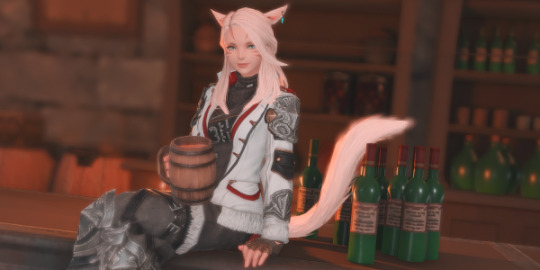
NAME: Ahru Hiraeth NICKNAME: Ru TITLE(S): The White Wolf, Warrior of Light ANCIENT: Nyx NAMEDAY: 21st Sun of the 4th Astral Moon AGE: 20s (v1) 30s (v2)
SPECIES: Miqo'te (Seeker-keeper lineage) PRONOUNS: She/Her PATRON: Oschon NATIONALITY: N/A ("Eorzean") BIRTHPLACE: Hyr'asra, Coerthas-Shroud Borderlands
CURRENT RESIDENCE: Kyanite's Apartment in S9, The Wanderers Rest (Empyreum), Second Wind (Shirogane) MARITAL STATUS: In a Relationship (Multiship/Multiverse) SEXUALITY: Bisexual ALIGNMENT: Chaotic Good OCCUPATION: Adventurer HOBBIES: Traveling, making music, fighting, journaling, reading (study of the Void has been her specialty and passion - but she’s always had a soft spot for epics and romances), fishing, knitting, cooking.
FAMILY: Ahnia Hiraeth (mother), X'rehl sas Corvellus (father), Nia'to Hiraeth (brother), Fianah Hiraeth (half-sister, V2), X'rhun Tia (uncle), X'yehnia Rehl (cousin), X'vehl Tia (cousin, retainer) FRIENDS: Lyse, Alphinaud, Thancred, Yulania, Regina, Riol, Dreyll, Zero LOVER/PARTNER: Varies by Verse PET/ANIMAL COMPANION: Arrow (chocobo), Grani (…Grani), Caesar (wolf 'pup’), Mochi (fat cat - King of the Rising Stones), Ardbert (black hayate - lives with Ryne and Gaia now), Baby (baby opo opo - not a pet this is her son) RIVAL/ENEMIES: Kivan, Zenos, Diabolos, Ilberd, Lolorito, Rowena (…and yet she has fucked the first half of these.)
DRINK: Water, tea (specifically mulled tea), wine, ale. Partial to mint lassi’s. FOOD: Salmon meuniere SNACKS: Honey muffins COLOR: Red, black, white FLOWER: Rose WEATHER: Gentle but heavy snowfall - the big clumpy flakes that make you feel like you're in a snow globe. SMELLS: Campfire smoke, cloves, leather, amber/incense, rarer but often enough the frosty fresh air of the colder climes she frequents.
DISCIPLINE: Bard, Red Mage, Viper, Paladin, Monk, Dark Knight, Reaper (Omni, but these are her specialties, albeit somewhat varying by verse.) FIGHTING STYLE: Despite often feeling like she's almost dancing or playing, she's quick and brutal. Even when utilizing magic or range she leans into the raw physicality and staying close to the heart of combat. Truly is just having the time of her life, even when the stakes are high. Now, when pushed to the brink and the stakes are particularly high and grim (see: loved ones in mortal danger), she leans into a more feral, snarling sort of violence, seeming nigh-merciless, but that can switch at the drop of a dime.
PRIZED POSSESSIONS: Crystal necklace, Azem crystal, journal (+writing implements) LANGUAGES: Omnilingual (Echo) FAVORITE PLACES: Ishgard, snowy cold places in general, Amaurot, Old Sharlayan, Azim Steppe, Crystarium, Solution 9 PREFERRED METHOD OF TRAVEL: By foot or mount.
#mine#ahru hiraeth#about: ahru#the image is titled: local cat about to knock ALL the shit off your table with tail
19 notes
·
View notes
Text
RVB OC Week Potential Ideas
Possible themes for each day, with examples of what could be done
(from @rubykgrant)
1- Introduction (Name, backstory, general info. Skills and abilities, weapons/special gear, designs with or without armor. Original OCs, self-inserts, and side characters who have been expanded on are welcome. Art, 3D models, dress-up game/icon makers, aesthetic/moodboards, playlists, text/writing all good examples. A single OC or multiple are fine)
2- Red Team/Blue Team (Would they be with the Reds or the Blues we know, Flag Zealots, Temple's group of Blues and Reds, with a totally different set of Red/Blue teams, or "in the middle" like Doc)
3- Project Freelancer and Charon (For any OCs who are Freelancers, or OCs who interact with them, such as scientists and pilots. Maybe the OC isn’t part of the program, but still knows some Freelancers. OCs who were part of Charon/the Insurrectionists, directly part of the fighting or involved in other ways)
4- AI/Robots and Other Worldly (For OCs who have an AI companion/interact with the AI, or perhaps ARE an AI. New AI Fragments, floating orbs/AI gods. Robots, vehicles/ships with their own personality. OCs that are different kinds of space aliens/creatures, OCs that aren’t human)
5- Chorus and Mercs (Would an OC be with the Feds or the News, friends with the Lieutenants or an assistant to Dr. Grey. Would they be part of the Mercenaries, either working with Felix and Locus/a different kind of space pirate)
6- Relationships (For any dating/romantic ships, friends and close companions, QPR, polyamory, found-family/long-lost relatives/time-traveling ancestors/descendants, etc. OCs having relationships with existing characters or other OCs welcome. Creators can ask each other if OCs can be paired together)
7- Energy Sword Sunday (OCs who have "Great Keys", any ideas about how it was acquired/how it is used, activating temples/ancient technology, any quests or prophecies, or epic sword fights with other wielders)
45 notes
·
View notes